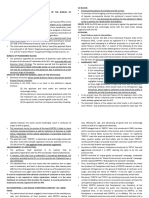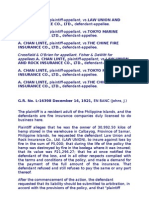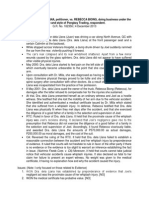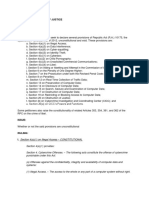MCC Industrial Vs Ssangyong
MCC Industrial Vs Ssangyong
Uploaded by
Nanette VillanuevaCopyright:
Available Formats
MCC Industrial Vs Ssangyong
MCC Industrial Vs Ssangyong
Uploaded by
Nanette VillanuevaOriginal Description:
Original Title
Copyright
Available Formats
Share this document
Did you find this document useful?
Is this content inappropriate?
Copyright:
Available Formats
MCC Industrial Vs Ssangyong
MCC Industrial Vs Ssangyong
Uploaded by
Nanette VillanuevaCopyright:
Available Formats
MCC INDUSTRIAL SALES CORPORATION VS.
SSANGYONG CORPORATION
G.R. No. 170633
October 17, 2007
FACTS:
Petitioner MCC Industrial Sales (MCC), a domestic corporation with office at Binondo,
Manila, is engaged in the business of importing and wholesaling stainless steel products. One of its
suppliers is the Ssangyong Corporation (Ssangyong), an international trading company with head
office in Seoul, South Korea and regional headquarters in Makati City, Philippines.
The two corporations conducted business through telephone calls and facsimile or telecopy
transmissions. Ssangyong would send the pro forma invoices containing the details of the steel
product order to MCC; if the latter conforms thereto, its representative affixes his signature on the
faxed copy and sends it back to Ssangyong, again by fax.
Respondent filed a civil action for damages due to breach of contract against petitioner
before the Regional Trial Court of Makati City. In its complaint, respondent alleged that defendants
breached their contract when they refused to open the letter of credit in the amount of
US$170,000.00 for the remaining 100MT of steel under Pro Forma Invoice Nos. ST2-POSTS0401-1
and ST2-POSTS0401-2.
After respondent rested its case, petitioner filed a Demurrer to Evidence alleging that
respondent failed to present the original copies of the pro forma invoices on which the civil action
was based. Petitioner contends that the photocopies of the pro forma invoices presented by
respondent Ssangyong to prove the perfection of their supposed contract of sale are inadmissible in
evidence and do not fall within the ambit of R.A. No. 8792, because the law merely admits as the
best evidence the original fax transmittal. On the other hand, Respondent claims that the
photocopies of these fax transmittals (specifically ST2-POSTS0401-1 and ST2-POSTS0401-2) are
admissible under the Rules on Evidence because the respondent sufficiently explained the non-
production of the original fax transmittals.
ISSUE:
Whether the print-out and/or photocopies of facsimile transmissions are electronic evidence and
admissible as such
RULING:
NO.
R.A. No. 8792, otherwise known as the Electronic Commerce Act of 2000, considers an
electronic data message or an electronic document as the functional equivalent of a written
document for evidentiary purposes. The Rules on Electronic Evidence regards an electronic
document as admissible in evidence if it complies with the rules on admissibility prescribed by the
Rules of Court and related laws, and is authenticated in the manner prescribed by the said Rules. An
electronic document is also the equivalent of an original document under the Best Evidence Rule, if
it is a printout or output readable by sight or other means, shown to reflect the data accurately.68
Thus, to be admissible in evidence as an electronic data message or to be considered as the
functional equivalent of an original document under the Best Evidence Rule, the writing must
foremost be an "electronic data message" or an "electronic document."
The Rules on Electronic Evidence promulgated by this Court defines the said terms in the
following manner:
SECTION 1. Definition of Terms. – For purposes of these Rules, the following terms are
defined, as follows:
xxxx
(g) "Electronic data message" refers to information generated, sent, received or stored by
electronic, optical or similar means.
(h) "Electronic document" refers to information or the representation of information, data,
figures, symbols or other modes of written expression, described or however represented, by
which a right is established or an obligation extinguished, or by which a fact may be proved
and affirmed, which is received, recorded, transmitted, stored, processed, retrieved or
produced electronically. It includes digitally signed documents and print-out or output,
readable by sight or other means, which accurately reflects the electronic data message or
electronic document. For purposes of these Rules, the term "electronic document" may be
used interchangeably with "electronic data message."
Given these definitions, we go back to the original question: Is an original printout of
a facsimile transmission an electronic data message or electronic document?
There is no question then that when Congress formulated the term "electronic data
message," it intended the same meaning as the term "electronic record" in the Canada law. This
construction of the term "electronic data message," which excludes telexes or faxes, except
computer-generated faxes, is in harmony with the Electronic Commerce Law's focus on "paperless"
communications and the "functional equivalent approach"82 that it espouses. In fact, the deliberations
of the Legislature are replete with discussions on paperless and digital transactions.
Facsimile transmissions are not, in this sense, "paperless," but verily are paper-based.
Ineluctably, the law's definition of "electronic data message," which, as aforesaid, is
interchangeable with "electronic document," could not have included facsimile transmissions, which
have anoriginal paper-based copy as sent and a paper-based facsimile copy as received. These two
copies are distinct from each other, and have different legal effects.
We, therefore, conclude that the terms "electronic data message" and "electronic document,"
as defined under the Electronic Commerce Act of 2000, do not include a facsimile transmission.
Accordingly, a facsimile transmissioncannot be considered as electronic evidence. It is not the
functional equivalent of an original under the Best Evidence Rule and is not admissible as electronic
evidence.
Since a facsimile transmission is not an "electronic data message" or an "electronic
document," and cannot be considered as electronic evidence by the Court, with greater reason is a
photocopy of such a fax transmission not electronic evidence. In the present case, therefore, Pro
Forma Invoice Nos. ST2-POSTS0401-1 and ST2-POSTS0401-2 (Exhibits "E" and "F"), which
are mere photocopies of the original fax transmittals, are not electronic evidence, contrary to the
position of both the trial and the appellate courts.
You might also like
- Project Ebooks at Global Green Books - Work Breakdown Structure and Responsibility Assignment MatrixDocument2 pagesProject Ebooks at Global Green Books - Work Breakdown Structure and Responsibility Assignment Matrixapi-561686395100% (1)
- KTA - Kinney Adapted TrainingDocument47 pagesKTA - Kinney Adapted TrainingAlex100% (2)
- AASHTO - Knowel AASHTO LRFD Movable Highway Bridge Design Specifications (2nd Edition) with 2008, 2010, 2011, 2012, 2014, and 2015 Interim Revisions.-American Association of State Highway and Transpor.pdfDocument313 pagesAASHTO - Knowel AASHTO LRFD Movable Highway Bridge Design Specifications (2nd Edition) with 2008, 2010, 2011, 2012, 2014, and 2015 Interim Revisions.-American Association of State Highway and Transpor.pdfDoutor Inácio100% (1)
- POGIL KeyDocument2 pagesPOGIL Keyfiue100% (1)
- Courage Vs Abad GR No. 400218Document4 pagesCourage Vs Abad GR No. 400218CJOY FALOGME100% (1)
- MCC v. Ssangyong - Case DigestDocument1 pageMCC v. Ssangyong - Case DigestMay Angelica Teneza100% (1)
- Legal Medicine ReviewerDocument4 pagesLegal Medicine ReviewerJonimar Coloma QueroNo ratings yet
- MCC v. SsangyongDocument3 pagesMCC v. SsangyongHana Chrisna C. RugaNo ratings yet
- Chapter 08-Expressing Past Time, Part 1Document98 pagesChapter 08-Expressing Past Time, Part 1Victor Pastrana100% (2)
- The Prevalence of Vaping E-Cigarettes Among University StudentsDocument15 pagesThe Prevalence of Vaping E-Cigarettes Among University StudentsFrederick TawiNo ratings yet
- Reliance-Trends-Project Almost FinishedDocument49 pagesReliance-Trends-Project Almost FinishedMunna Munna100% (1)
- MCC V Ssangyong-DigestDocument4 pagesMCC V Ssangyong-DigestKristina B DiamanteNo ratings yet
- Napocor Vs CodillaDocument2 pagesNapocor Vs CodillaRidzsr DharhaidherNo ratings yet
- Digest 14 - Vinzons-Chato V HRET - GR 199149 - January 22 2013Document2 pagesDigest 14 - Vinzons-Chato V HRET - GR 199149 - January 22 2013Kriska Herrero TumamakNo ratings yet
- Republic of The Phils vs. Imelda Imee Marcos-ManotocDocument4 pagesRepublic of The Phils vs. Imelda Imee Marcos-ManotocAJMordeno100% (1)
- Torres vs. PagcorDocument2 pagesTorres vs. PagcorKat Miranda100% (1)
- 60 Amada Resterio Vs PeopleDocument2 pages60 Amada Resterio Vs PeopleGSS100% (1)
- Martires v. ChuaDocument4 pagesMartires v. Chuachappy_leigh118No ratings yet
- UFC V Barrio FiestaDocument2 pagesUFC V Barrio FiestaRean Raphaelle GonzalesNo ratings yet
- UNIWIDE SALES REALTY v. TITAN-IKEDADocument16 pagesUNIWIDE SALES REALTY v. TITAN-IKEDACyrusNo ratings yet
- Cereno Vs CaDocument2 pagesCereno Vs CaLittle Girlblue67% (3)
- Dantis v. Maghinang, Jr. DIGESTDocument4 pagesDantis v. Maghinang, Jr. DIGESTkathrynmaydeveza100% (1)
- Rodriguez Luna+v+IACDocument2 pagesRodriguez Luna+v+IACNadine Malaya NadiasanNo ratings yet
- 24 Dantis Vs MaghinangDocument2 pages24 Dantis Vs MaghinangMichelle Silva0% (1)
- Case Digests CopyrightDocument6 pagesCase Digests CopyrightRio AborkaNo ratings yet
- AIR PHILIPPINES vs. PENNSWELL, INC.Document1 pageAIR PHILIPPINES vs. PENNSWELL, INC.Jayson Gabriel Soriano100% (5)
- G.R. No. 227734 - Alba v. EspinosaDocument11 pagesG.R. No. 227734 - Alba v. EspinosaMaxxNo ratings yet
- Pearl & Dean vs. ShoemartDocument2 pagesPearl & Dean vs. ShoemartJakeDanduan100% (5)
- 2015 Taxation Law - Atty Noel Ortega PDFDocument28 pages2015 Taxation Law - Atty Noel Ortega PDFViner VillariñaNo ratings yet
- Sps Latip Vs ChuaDocument2 pagesSps Latip Vs ChuaLeica JaymeNo ratings yet
- PNOC Shipping and Transport Corporation v. Court of Appeals, G.R. No. 107518, October 8, 1998Document2 pagesPNOC Shipping and Transport Corporation v. Court of Appeals, G.R. No. 107518, October 8, 1998Faithmae100% (1)
- ASIAVEST VS. CA AND PNCC - Case DigestsDocument5 pagesASIAVEST VS. CA AND PNCC - Case DigestsJosine ProtasioNo ratings yet
- Dangwa Vs CADocument2 pagesDangwa Vs CANikki Joanne Armecin LimNo ratings yet
- Land Titles - Nov 7-8Document48 pagesLand Titles - Nov 7-8Marj BaquialNo ratings yet
- Madrigal v. CA DigestDocument2 pagesMadrigal v. CA DigestFrancis Guinoo100% (1)
- Chiquita Brands, Inc. v. OmelioDocument3 pagesChiquita Brands, Inc. v. OmelioKastin SantosNo ratings yet
- Banking DigestDocument13 pagesBanking DigestEzekiel Japhet Cedillo EsguerraNo ratings yet
- Kho Vs CA Et Al DigestDocument1 pageKho Vs CA Et Al DigestTrina Donabelle Gojunco100% (4)
- Catacutan vs. PeopleDocument3 pagesCatacutan vs. PeopleKaren Patricio LusticaNo ratings yet
- Koppel v. Makati Rotary DigestDocument4 pagesKoppel v. Makati Rotary DigestAnonymous oTRzcSSGun100% (1)
- Gumabon V PNBDocument4 pagesGumabon V PNBCarlos JamesNo ratings yet
- Chan Linte vs. Law UnionDocument4 pagesChan Linte vs. Law UnionAngela Michelle PaguioNo ratings yet
- Consolidated Bank Vs Del Monte Motor WorksDocument1 pageConsolidated Bank Vs Del Monte Motor WorksBenBulacNo ratings yet
- DM Consunji v. CADocument2 pagesDM Consunji v. CAjrvyee0% (1)
- Equitable PCI Bank vs. Manila Adjuster and Surveyors Inc. (Case Digest - Rule 45 of The ROC) GEPTYDocument1 pageEquitable PCI Bank vs. Manila Adjuster and Surveyors Inc. (Case Digest - Rule 45 of The ROC) GEPTYVincent Adrian Gepty100% (1)
- DRA. LEILA A. DELA LLANA, Petitioner, vs. REBECCA BIONG, Doing Business Under The Name and Style of Pongkay Trading, RespondentDocument3 pagesDRA. LEILA A. DELA LLANA, Petitioner, vs. REBECCA BIONG, Doing Business Under The Name and Style of Pongkay Trading, RespondentBoggs Talpis TanggolNo ratings yet
- Abakada Guro Vs Ermita (Sep and Oct 2005) DigestDocument4 pagesAbakada Guro Vs Ermita (Sep and Oct 2005) DigestLizzie GeraldinoNo ratings yet
- Chan vs. Chan G.R. No. 179786 DigestDocument2 pagesChan vs. Chan G.R. No. 179786 DigestSherwin Delfin Cinco75% (4)
- GR No. 20040, January 17, 2018 (MRT Devt Corp. Vs Gammon Philippines)Document8 pagesGR No. 20040, January 17, 2018 (MRT Devt Corp. Vs Gammon Philippines)Sai PastranaNo ratings yet
- CIR Vs Mirant PagbilaoDocument2 pagesCIR Vs Mirant PagbilaoTonifranz Sareno50% (2)
- Ada Vs BaylonDocument2 pagesAda Vs BaylonZhadlerNo ratings yet
- 73 Spouses Serfino v. Far East Bank and Trust Company (Now Bpi)Document1 page73 Spouses Serfino v. Far East Bank and Trust Company (Now Bpi)GSSNo ratings yet
- Converse Rubber Corp v. Jacinto Rubber and Plastic Co.Document3 pagesConverse Rubber Corp v. Jacinto Rubber and Plastic Co.corinNo ratings yet
- Rafael Arsenio Dizon vs. CTA & CIR (Digest)Document2 pagesRafael Arsenio Dizon vs. CTA & CIR (Digest)madzarellaNo ratings yet
- Midterms PaleDocument27 pagesMidterms PaleAlyk Tumayan CalionNo ratings yet
- BP Oil and Chemicals International Phils Vs Total Distribution and Logistic Systems IncDocument4 pagesBP Oil and Chemicals International Phils Vs Total Distribution and Logistic Systems IncNatasha GraceNo ratings yet
- ADR Prudential Guarantee Assurance vs. Anscor Case DigestDocument2 pagesADR Prudential Guarantee Assurance vs. Anscor Case DigestJessa MaeNo ratings yet
- DIGEST - Cagayan Electric Power and Light Co., Inc. v. City of Cagayan de OroDocument5 pagesDIGEST - Cagayan Electric Power and Light Co., Inc. v. City of Cagayan de OroJames Ryan AlbaNo ratings yet
- AMLA Case DigestsDocument4 pagesAMLA Case DigestsLorenz Vergil Reyes100% (1)
- Sales DigestDocument13 pagesSales DigestJan MartinNo ratings yet
- NPC v. CADocument2 pagesNPC v. CAEmir MendozaNo ratings yet
- Code of Commerce 2003Document12 pagesCode of Commerce 2003Ngan TuyNo ratings yet
- KLM Royal Dutch Airlines vs. TiongcoDocument2 pagesKLM Royal Dutch Airlines vs. TiongcoJay jogs100% (3)
- MCC INDUSTRIAL SALES CORPORATION Vs SangyongDocument2 pagesMCC INDUSTRIAL SALES CORPORATION Vs SangyongecalotaNo ratings yet
- MCC Vs SsangyongDocument3 pagesMCC Vs SsangyongAnonymous gQopCrNo ratings yet
- MCC INDUSTRIAL SALES CORPORATION, Petitioner, vs. SSANGYONG CORPORATION, Respondents.Document2 pagesMCC INDUSTRIAL SALES CORPORATION, Petitioner, vs. SSANGYONG CORPORATION, Respondents.JASON BRIAN AVELINONo ratings yet
- MCC Indutrial Sales Corporation V Ssangong CorporationDocument2 pagesMCC Indutrial Sales Corporation V Ssangong Corporationclaudenson18No ratings yet
- Prayer Before Studying For The 2021 Bar ExamDocument1 pagePrayer Before Studying For The 2021 Bar ExamNanette VillanuevaNo ratings yet
- People Vs EnojasDocument2 pagesPeople Vs EnojasNanette VillanuevaNo ratings yet
- Nuez Vs Cruz-ApaoDocument2 pagesNuez Vs Cruz-ApaoNanette VillanuevaNo ratings yet
- Disini Vs Sec of JusticeDocument10 pagesDisini Vs Sec of JusticeNanette VillanuevaNo ratings yet
- Sci Digest Circ Respir Systems v1Document36 pagesSci Digest Circ Respir Systems v1draganNo ratings yet
- Theory of Structure and Mechanics of Fibrous AssembliesDocument332 pagesTheory of Structure and Mechanics of Fibrous AssembliesSupriyo ChakrabortyNo ratings yet
- Conceptual Selling OverviewDocument2 pagesConceptual Selling OverviewAlexandra BuradaNo ratings yet
- A Commentary On "The Transformative Power of Classical Music"Document4 pagesA Commentary On "The Transformative Power of Classical Music"Sun NguyễnNo ratings yet
- 2ND Egb Pud - 1T - 2023-2024Document7 pages2ND Egb Pud - 1T - 2023-2024Jazmín LopezNo ratings yet
- MoralDocument12 pagesMoralakhil vermaNo ratings yet
- Camagay 2013Document24 pagesCamagay 2013hzdfbfzNo ratings yet
- St. Clare College: Student HandbookDocument95 pagesSt. Clare College: Student HandbookHUMSS 12 6B AVELLANO ALTHEA A.No ratings yet
- Vanhoozer - LecturaDocument29 pagesVanhoozer - LecturaSamuel Esteban Guevara EvangelistaNo ratings yet
- Derivation and NumericalsDocument13 pagesDerivation and Numericalspiravi66No ratings yet
- Lesson 1Document5 pagesLesson 1Carmen LaflorNo ratings yet
- The Parents Handbook. Systematic Trai... (Z-Library)Document148 pagesThe Parents Handbook. Systematic Trai... (Z-Library)Qizhi NeoNo ratings yet
- Cpar Q1 Las 1Document10 pagesCpar Q1 Las 1Jaslor LavinaNo ratings yet
- Quotes by Sri Sri RavishankarDocument11 pagesQuotes by Sri Sri RavishankarShailesh MishraNo ratings yet
- Easa Part-147 Mtoe Checklist: 1. ScopeDocument36 pagesEasa Part-147 Mtoe Checklist: 1. ScopeTDHNo ratings yet
- Course Code 8615 Assignment No. 2 Q.1 Explain Behavioral Systems Analysis (BSA) and Its Role To Improve Individual and System PerformanceDocument15 pagesCourse Code 8615 Assignment No. 2 Q.1 Explain Behavioral Systems Analysis (BSA) and Its Role To Improve Individual and System PerformanceAneel Hussain 715-FBAS/MSMA/F20No ratings yet
- Deploy Qlik Sense Enterprise On KubernetesDocument45 pagesDeploy Qlik Sense Enterprise On Kubernetesstubadub99No ratings yet
- EnzymeDocument23 pagesEnzymevivin100% (1)
- 12 Sbio1001b Sports Equipment Classification KeyDocument2 pages12 Sbio1001b Sports Equipment Classification Keyarwengandionco123No ratings yet
- A Peek Inside The IVF Lab11Document19 pagesA Peek Inside The IVF Lab11Mohamed ElhelalyNo ratings yet
- De Garcia VDocument3 pagesDe Garcia VellaNo ratings yet
- SGL3 Speaking PDFDocument1 pageSGL3 Speaking PDFQasim AliNo ratings yet
- A Machine Learning Approach To Investigate The Relationship Between Shape Features and Numerically Predicted Risk of Ascending Aortic AneurysmDocument15 pagesA Machine Learning Approach To Investigate The Relationship Between Shape Features and Numerically Predicted Risk of Ascending Aortic AneurysmArjun janamattiNo ratings yet





























































































